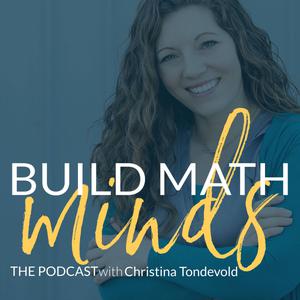
The Build Math Minds Podcast
Christina Tondevold
For educators who want to build their students' math minds and not just create calculators.
- 8 minutes 45 secondsEpisode 185 - Tasks for Building Thinking Classrooms - Virtual Math Summit 2025 preview
In Episode 185, we dive into Building Thinking Classrooms (BTC), one of the most transformative approaches in mathematics education. Learn why this popular teaching method is more than just vertical surfaces and random groups - it's about creating environments where students truly think and engage with mathematics. This episode addresses a common misconception about BTC and previews the Peter Liljedahl & Maegan Giroux’s 2025 Virtual Math Summit opening keynote. Plus, get insights from their new book 'Mathematics Tasks for the Thinking Classroom.' Whether you're new to BTC or looking to deepen your practice, this episode gives you some important things to contemplate so you can implement thinking classrooms effectively.
Register for the Virtual Math Summit: https://virtualmathsummit.com/
To get any links mentioned in the episode go to: https://buildmathminds.com/185
To see this episode instead of just listen, go to https://www.youtube.com/BuildMathMinds
19 January 2025, 10:00 pm - 13 minutes 11 secondsEpisode 184 - Don’t Discount the Use of Games in Your Classroom
Transform both your math AND reading instruction with two powerful game-based resources! In this episode, discover how to implement engaging games that provide meaningful practice without the typical hassles of game setup and complicated rules. Learn about Reading Simplified's "Switch It" game for building foundational reading skills, and explore the versatile "Evergreen Games" for math practice that can be adapted for any math concept throughout the year. These games offer the perfect balance of fun and learning, allowing students to get multiple repetitions while actually enjoying the practice!
Key Takeaways:
-
Learn about two free game resources for math and reading
-
Discover how to adapt games for different math concepts
-
Understand why games are more effective than worksheets
-
Access templates you can use all year long
Request Switch It! from Reading Simplified here: https://readingsimplified.com/switch-it/?utm_source=Affiliate&utm_campaign=BMM
Get the Evergreen Games Template document here: buildmathminds.com/games
Register for the Virtual Math Summit: https://virtualmathsummit.com/
To see this episode instead of just listen, go to https://www.youtube.com/BuildMathMinds
To get any links mentioned in the episode go to: https://buildmathminds.com/184
12 January 2025, 10:00 pm -
- 8 minutes 48 secondsEpisode 183 - The Count - Uncovering Mathematical Structure in Elementary Classrooms
The Count is an activity from John SanGiovanni's book that turns simple counting into a deep mathematical exploration. In this episode, learn how this routine helps elementary students engage with Math Practice #7 by looking for and making use of mathematical structure. We'll break down how a seemingly simple counting sequence can develop number sense, encourage mathematical thinking, and create a low-pressure environment for pattern recognition.
Key Takeaways:
-
Learn what "The Count" activity is and how to implement it
-
Understand how counting can develop deeper mathematical thinking
-
Questions to help students look for and use the patterns created by the structure of numbers
To see this episode instead of just listen, go to https://www.youtube.com/BuildMathMinds
To get any links mentioned in the episode go to: https://buildmathminds.com/183
Get the special offer to join the Build Math Minds PD site at https://buildmathminds.com/special
15 December 2024, 10:00 pm -
- 10 minutes 24 secondsEpisode 182 - Visual Patterns: The Secret Weapon for Teaching The Math Practices
Discover how Visual Patterns can transform mathematical thinking in your elementary classroom! Listen in as we explore Fawn Nguyen's powerful activity that engages students in all 8 Standards of Mathematical Practice. Learn how a single activity can help students reason, argue, model, and see the hidden structures in mathematics. This episode is a must-listen for educators looking to make math more engaging, meaningful, and accessible for their students.
Key Takeaways:
-
Understand how Visual Patterns support mathematical thinking
-
Learn strategies to engage students across all Math Practice Standards
-
Discover a low-prep, high-impact math resource
To see this episode instead of just listen, go to https://www.youtube.com/BuildMathMinds
To get any links mentioned in the episode go to: https://buildmathminds.com/182
8 December 2024, 10:00 pm -
- 9 minutes 5 secondsEpisode 181 - Exploring Patterns Through Number Routines
The predictability of mathematics is one of the things I love about math. There are some great activities you can do in your classroom with your students to help them see & USE that predictability. Last week I shared one (Leaping Numbers) and this week I’m sharing another: Finding One and All. This is a great number routine that is similar, yet different, to Number Strings and is a wonderful way to get your students engaged in Math Practice #7: Look For and Make Use of Structure.
To see this episode instead of just listen, go to https://www.youtube.com/BuildMathMinds
To get any links mentioned in the episode go to: https://buildmathminds.com/181
For Build Math Minds Members, log in here to access the done-for-you routine: https://pd.buildmathminds.com/
If you aren’t a member you can join here: https://buildmathminds.com/bmm/
1 December 2024, 10:00 pm - 5 minutes 13 secondsEpisode 180 - Leaping Numbers: a great math activity for exploring patterns
Want a fun, engaging, and mathematically powerful activity to help keep your students engaged in math until the holiday break? In this episode I’m sharing a new activity by one of my favorite creators, Steve Wyborney, Leaping Numbers. This activity is a great way to get your students doing Standard of Math Practice #7: Look For & Make Use of Structure.
To see this episode instead of just listen, go to https://www.youtube.com/BuildMathMinds
To get any links mentioned in the episode go to: https://buildmathminds.com/180
24 November 2024, 10:00 pm - 6 minutes 7 secondsEpisode 179 - A Math Hack That Isn’t a Hack
Math tricks or hacks are everywhere, but which ones should you actually use with your students? I came across one this week on social media and thought I’d use it as an example to give you some ideas on how to approach the use of math tricks in your classroom.
To see this episode instead of just listen, go to https://www.youtube.com/BuildMathMinds
To get any links mentioned in the episode go to: https://buildmathminds.com/179
17 November 2024, 10:00 pm - 7 minutes 5 secondsEpisode 178 - Students who struggle with Less Than problems
This week’s episode comes from a question that was sent in about helping students who struggle with math problems that are written differently than kids typically see them. These types of “less than” math problems are strange because kids don’t often encounter them in that way even in their own lives. I’m giving you two tips to help students so that these types of problems aren’t so difficult for them.
To see this episode instead of just listen, go to https://www.youtube.com/BuildMathMinds
To get any links mentioned in the episode go to: https://buildmathminds.com/178
10 November 2024, 10:00 pm - 4 minutes 30 secondsEpisode 177 - Math Misconceptions
Math Misconceptions might just look like mistakes that your students are making, but they are usually slightly different. Mistakes happen when we don’t remember, or remember incorrectly, whereas Misconceptions are rooted in understanding…we believe this is the way it is. Mistakes happen from time to time, and are usually not anything to get too worried about. But Misconceptions stem from a person’s understanding of something and if it isn’t addressed it will forever be misunderstood. In this episode I’m introducing you to our series of short videos we have put together to start a conversation about math misconceptions kids have in the elementary grade.
Watch the Math Misconceptions videos in this Playlist on YouTube:
To get any links mentioned in the episode go to: https://buildmathminds.com/177
3 November 2024, 10:00 pm - 9 minutes 18 secondsEpisode 176 - Avoiding the Trap of Algorithms
In this episode I’m introducing you to a not-yet-released book about the traps of math algorithms, but it’s actually so much more than that. It’s about women supporting women and lifting someone up when you see they are doing good instead of trying to tear them down.
To see this episode instead of just listen, go to https://www.youtube.com/BuildMathMinds
To get any links mentioned in the episode go to: https://buildmathminds.com/176
27 October 2024, 9:00 pm - 10 minutes 9 secondsEpisode 175 - Always Building Relationships - Rounding Numbers Series
Rounding numbers should be way more than just a procedure where we ask students to look to see if the number behind is a 5 or higher. Helping elementary students round should be based upon their number sense. In this last episode of the Rounding Numbers series, I’m giving you an acronym to remember to help your students with rounding numbers: ABR. To see this episode instead of just listen, go to https://www.youtube.com/BuildMathMinds
To get any links mentioned in the episode go to:
20 October 2024, 9:00 pm - More Episodes? Get the App
Your feedback is valuable to us. Should you encounter any bugs, glitches, lack of functionality or other problems, please email us on [email protected] or join Moon.FM Telegram Group where you can talk directly to the dev team who are happy to answer any queries.
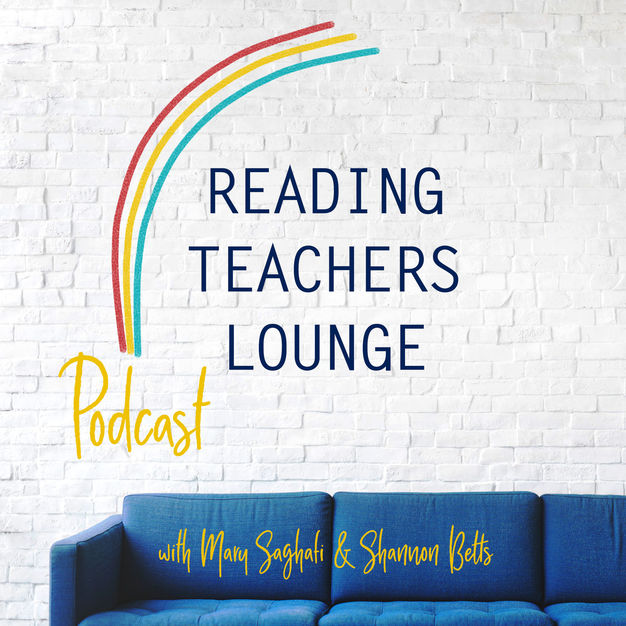 Reading Teachers Lounge
Reading Teachers Lounge
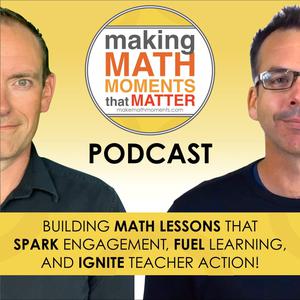 Making Math Moments That Matter
Making Math Moments That Matter
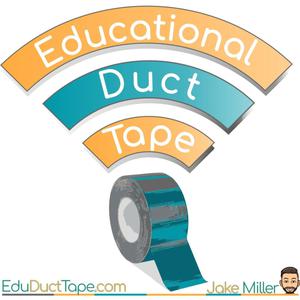 Educational Duct Tape
Educational Duct Tape
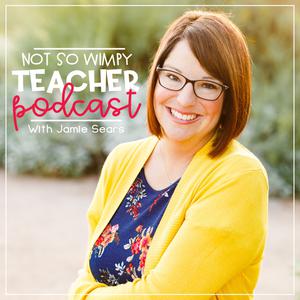 Not So Wimpy Teacher Podcast
Not So Wimpy Teacher Podcast
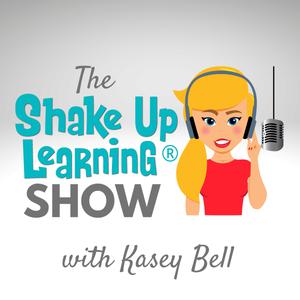 Shake Up Learning Show
Shake Up Learning Show
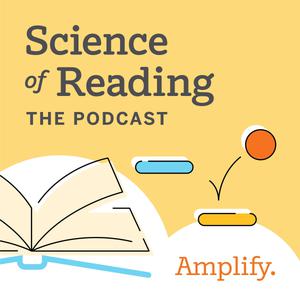 Science of Reading: The Podcast
Science of Reading: The Podcast